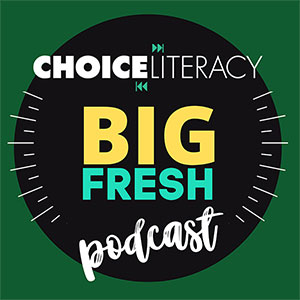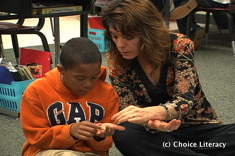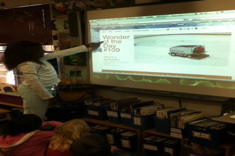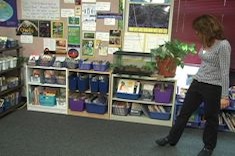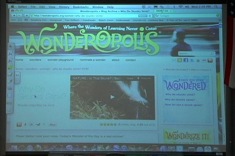In this podcast, Franki Sibberson chats with Georgia Heard about the importance of a sense of wonder and “pondering time” in classrooms. Georgia is a poet and teaching consultant. Her books include A Place for Wonder and Falling Down the Page
. You can follow Georgia’s work at her website http://georgiaheard.com/
A full transcript is available below the player.


Franki Sibberson: Georgia, you believe strongly that classrooms should make room for children’s wonders. How do you suggest teachers get started with this?
Georgia Heard: Well, I wrote about this in A Place for Wonder, but I believe that we should be setting aside time every week for what I call pondering time. Ponder, I explain to my students, really means to think deeply about something. It’s just a time for kids to reflect on what they’ve been learning that week, that day, and to ask some questions like, “What has raised more questions for you, of all the things that we’ve been talking about this week? What else do you really want to know about?” I think it’s a way for them to sift through all the knowledge that they’ve been taking in over the week and ask themselves, “What really interests me about what I’m learning?”
I think, also, starting especially with the primary kids with the wondering center, even for the older students, having a place in your writer’s notebook for wonder. I think that reflection time is really important. A time to pause and – I think we keep filling up the vessel with information. I think we all need to stop and ask, “What really matters to us here, of everything that I’ve learned so far?” I would start with pondering time.
Franki Sibberson: This is kind of a follow-up to that, but it sounds like a lot of that is connected to what they’re learning in school, that you guide the conversation a little bit sometimes to the week of learning.
Georgia Heard: Kids, especially young kids, are naturally curious, but sometimes seeing the big picture, asking the big questions, sometimes we have to guide them by modeling. Instead of the tiny little questions which, I think, are important also, and especially for younger kids, they’re going to ask probably smaller questions, but for the older students, it’s really important for them to just sift through everything and for us to guide them in asking the big picture questions.
Franki Sibberson: That makes so much sense. So why do you think wonder matters when it comes to nonfiction reading and writing? What connection do you see there?
Georgia Heard: Well, I think just from my own experience as a nonfiction writer that unless I’m really fascinated and interested and have a lot of questions about a topic, I’m not going to really be that interested in writing about it or even reading about it. I think that questions about a topic, I think it’s really like a rudder on a boat, and it steers our reading and eventually our writing. I know that even with nonfiction poetry, when I wrote Creatures of Earth, Sea, and Sky, and it was all about animals. The way I approached each animal was just asking myself what fascinated me or what amazed me about this animal, and then trying to be even more specific, like with the snake. What is it that I really want to know about snakes? The question that I had was about shedding their skin, that was fascinating to me, and how often do they shed their skins? Do they start from the top or the bottom? Is their new skin underneath already?
All these questions, which then resulted in a poem, but any kind of nonfiction writing. In fact, I’m working on two nonfiction books right now. One is a picture book biography and another is a story, and the questions are the things that keep me going and steer my research. So I think it’s crucial for kids to have that fascination, that interest, and I think the more we learn about something, the more questions we have, and that will just perpetuate more and more questions.
Franki Sibberson: It seems to be easier in primary classrooms, with younger students. How have you seen teachers of older elementary or even older students create environment that values wonder?
Georgia Heard: Well, I think you’re right. I think it does happen more in the primary grades, but I think that what I mentioned before about having pondering time, I’ve seen teachers implementing that in their classrooms where they designate a period of time, an hour, forty-five minutes if you have it, one time during the week where kids can really reflect. Sometimes teachers have what we call the wonder of the week, and it’s a big picture question. Again, this is where the modeling comes in. It’s not just an English class or reading, it can be within the social studies or science or current events.
For instance, if they’re studying Colonial history in history class, what is it like to be a child during Colonial times in Salem? A big question that you model for them and then have kids discuss, and then eventually, of course, the kids will be asking their own questions. The more they ask, I think, the more deep the questions are. Then also, some teachers have kids keep what they call the wonder journal that’s just for this pondering time and reflection time that they use writing. They go into discussions after that, and have conversations. So, it’s part of either your writer’s notebook or have a separate wonder journal.
Franki Sibberson: You’ve probably answered this one too. The practical ideas that go along with this idea, some ideas you’ve tried or seen in classrooms. Can you maybe talk specifically about what might happen in a wonder journal, or where kids might go with that, or something that you’ve seen, a specific story?
Georgia Heard: Well, for instance, in English class, if they keep a journal and they ask questions in this journal, or even part of their reading journal, what I’ve found is that the teacher is looking over the journal and looking to see where they are in terms of the questions, then having those questions be taken out as part of group discussion questions. But the questions all come from the kids then. Again, not every question is the same. There’ll be smaller questions and then there’ll be larger, and that is developmental, I think, and that can tell us a lot about the kinds of thinking kids are doing. But I think that if we don’t model this, again, as I said, that kind of curiosity and thinking about the big picture of what we’re learning in school and how it relates to our lives and our pasts, I think that gets lost, and then school becomes boring for kids.
Franki Sibberson: That’s so smart, the smaller questions versus the larger questions. I love learning about the child based on the kind of questions they ask. So smart. So, you’ve been thinking about this topic of wonder and curiosity in the classroom for a while. Has your thinking evolved since you first learned about it, or what’s changed for you in your thinking?
Georgia Heard: I guess I started out just thinking about the primary grades because it’s what they do all day, they ask so many questions. But as I’ve been in classrooms and I’ve worked with older students, and even middle school, I realize that there’s such a need for this with the older students. So I wish, not that I included it in the book because it’s really for primary, but there should be another book just about –
Franki Sibberson: I know! You need to write one.
Georgia Heard: Yeah, that’s my next project, maybe.
Franki Sibberson: No, but I think your book has so many – I don’t look at it as a primary book. I think it’s so universal in terms of what we ask kids to do and what we give them time to do, so –
Georgia Heard: Thank you.
Franki Sibberson: So yeah, have you thought more specifically, then, about intermediate and older, is that what you’re thinking?
Georgia Heard: Yeah, I think so. Specifically, with all the different content area learning that kids are doing, I think it’s just so important to personalize and deepen the information and the content by having them keep journals, as I said, and have that reflection time, and really modeling the big deeper questions for them.

